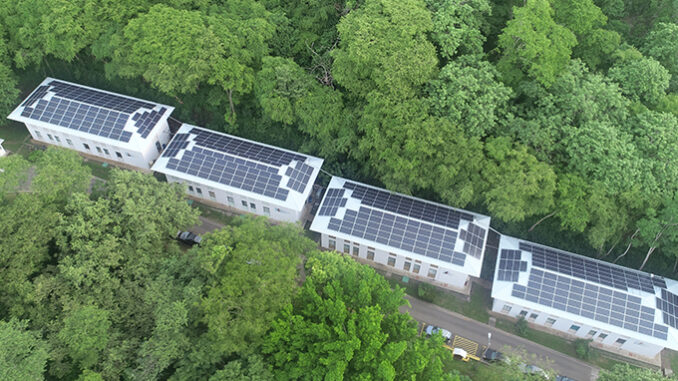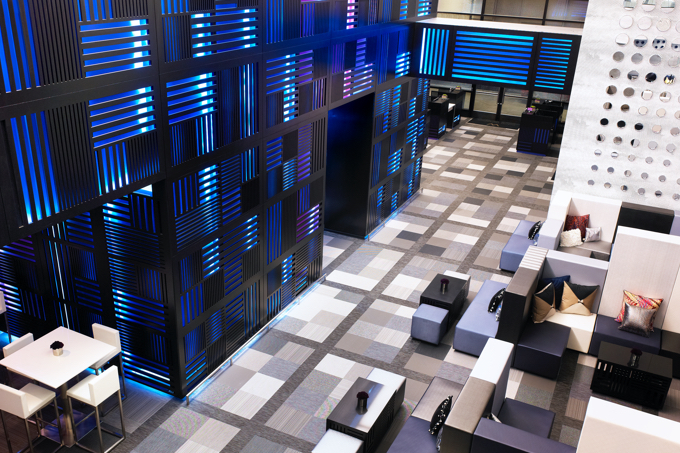
By HTN Staff - 10.21.2021
Increasingly, in response to both guest and employee pressure, as well existing or anticipated regulatory requirements, hotels are increasingly utilizing next-generation technologies to achieve sustainability and eco-friendly practices in their operations. These practices range from reduced hotel energy consumption and hotel waste to eco-friendly construction materials. The following are a few recent developments.
Marriott Signs on to the “Race to Zero”
Marriott International, the largest hotel chain in the world by the number of available rooms, has submitted a letter committing “to set science-based emissions reduction targets in line with 1.5°C emissions scenarios,” according to a press statement. In line with the criteria and recommendations of an initiative from Science Based Targets, an organization that aims to drive ambitious climate action in the private sector, the company is also committing “to set a long-term science-based target to reach net-zero value chain greenhouse gas (GHG) emissions by no later than 2050.”
private sector, the company is also committing “to set a long-term science-based target to reach net-zero value chain greenhouse gas (GHG) emissions by no later than 2050.”
With support from a number of organizations, including Global Citizen, an international education and advocacy organization, Marriott has officially signed on to the “Race to Zero,” a global campaign rallying companies, cities, regions, and financial and educational institutions, to reach net-zero value chain greenhouse gas emissions by no later than 2050 (which, some critics may argue, is a timeline that hardly screams “climate emergency.”). Participants are committed to the overarching goal of reducing emissions across all scopes in line with the Paris Agreement, with transparent action plans and robust near-term targets.
“We are driven to make a positive and sustainable impact wherever we do business, and this rigorous climate commitment to reach net-zero emissions is a needed step for us to do our part to help the communities and environments where we live, work and visit remain resilient and vibrant,” said Anthony Capuano, Chief Executive Officer, Marriott International, in a press statement. “Even as we navigate one of the industry’s most difficult periods, we know this ambition will be a challenge. We are proud to join companies and institutions around the world striving to tackle climate change and build a healthier, more sustainable world.”
Marriott International’s portfolio of hotels has been working to reduce its carbon footprint as part of its existing 2025 sustainability goals. According to the company, which has 30 brands with 7,642 properties containing 1,423,044 rooms in 131 countries and territories, this latest commitment to climate action is the next step in its sustainability journey.
In a press statement, the company explained that achieving these new targets will require partnering with Marriott’s associates across disciplines along with the company’s hotel owners and franchisees. Over time, initiatives may include increased use of renewable energy, building electrification to maximize renewable electricity, continued modifications to design standards so buildings are more efficient, and the installation of automation systems and energy efficiency upgrades (for example, smart thermostats).
In addition to the company’s goal to provide further visibility to the carbon footprint and environmental impact of their travel with Marriott, guests and customers will reportedly see an enhanced focus on existing sustainability efforts such as solid waste and food waste reduction and natural capital restoration, with the opportunity to participate in activities such as reforestation as well as coral and mangrove plantings.
Marriott’s announcement is said to align with the company’s sustainability and social impact platform, Serve 360: Doing Good in Every Direction, which guides Marriott’s commitment to help take on the world’s most pressing social, environmental, and economic issues, delivering value for associates, customers, owners, the environment, and communities around the world. It also builds on Marriott’s “long-standing history of embedding sustainability throughout its business strategy, operations and value chain.”
Recent initiatives include:
- The reduction of single-use plastics including replacing tiny, single-use toiletry bottles of shampoo, conditioner and bath gel in guestroom showers with larger pump-topped bottles. When fully implemented across the globe in 2022, the company’s expanded toiletry program is expected to prevent about 500 million tiny bottles annually from going to landfills.
- The roll-out of an internal food waste prevention and reduction educational campaign, designed to support Marriott’s goal to reduce food waste by 50%.
- The launch of a publicly available responsible sourcing guide, to help Marriott’s supplier community join its sustainability journey on the path to responsibly sourcing 95% of the company’s top ten priority categories.
- The development of a certifications database to help properties operate more responsibly and work towards the goal of 100% of the portfolio receiving a third-party sustainability certification.
- Planting more than 415,000 trees over the last several years, including through the company’s work as a founding member of the Evergreen Alliance, a select group of Arbor Day Foundation partners and collaborators committed to advancing trees and forests as natural solutions for corporate sustainability and citizenship goals.
- Innovative ecosystem restoration and carbon sequestration projects, such as working with The Ocean Foundation to remove and repurpose sargassum seaweed, which has had devastating impacts on the environment.
“Starting with the company’s core value to Serve Our World, and its first-generation environmental impact reduction goals, to its latest series of waste reduction initiatives, Marriott is promoting the sustainable development of the communities in which it operates, as well as the resiliency and longevity of the business,” said a company spokesperson. “Marriott’s sustainability strategy is driven by a wide range of initiatives to reduce environmental impacts through the construction and operation of sustainable hotels and responsible sourcing while protecting and restoring the ecosystems on which life depends.”
Accor Joins the “Green Stay Initiative”
Meanwhile, Accor, which also ranks as a leading hospitality group, has joined HRS’ new Green Stay Initiative. HRS launched the program in March with the goal of providing a transparent avenue for hotels to share performance metrics on energy, water and waste, while also enabling corporations to steer bookings to hotels aligned with their carbon-related goals.
Using an algorithm based on validated United Nations and Greenhouse Gas Protocol methodologies, HRS then delivers analytical data to travel program leaders to consider during their hotel procurement process. Icons in online booking displays are designed to make it easy for travelers to see the preferred green hotels in their program, further enhancing compliance. HRS works with more than one-third of the Fortune 500 on their hotel programs (more than 70,000 hotels reportedly joined HRS’ Clean & Safe Protocol in 2020) and Accor is the first global hospitality group to join the Green Stay Initiative.

“The world’s leading multi-national companies are promoting their aspirations to achieve net-zero operations by 2030 or sooner. These company-wide goals impact managed travel programs, who are tasked to travel more sustainably as they recover from the pandemic,” said HRS CEO Tobias Ragge. “Dozens of corporations have already indicated in their hotel RFPs that metrics on energy, water and waste are required for consideration. The need for automation to efficiently deliver such data from hotels to procurement leaders and travelers is vital in today’s corporate lodging landscape.”
Like Marriott and other major hotel brands, Accor has worked in recent years to implement initiatives related to plastic elimination, carbon-neutral buildings, food waste and energy consumption. “We’re happy to collaborate with HRS to help amplify our sustainability improvements,” said Markus Keller, Senior Vice President of Sales & Distribution of Accor. “We’re committed to an ongoing effort in this area to help keep the planet safe and secure safe traveling for future generations to come.”
The “World’s First Whole Life Net Zero Carbon Hotel” to Open Its Doors
Smaller, independent hotels and hospitality companies are also embracing sustainability. A good example is room2, which will reportedly open the world’s first whole life net zero carbon hotel in Chiswick, London, in December. Expected to be 89% more energy efficient than the typical UK hotel, room2 Chiswick has, according to a press statement, been built with “pioneering technologies to achieve net zero throughout both the design and construction stages and throughout its whole life, which, in a hotel industry first, includes both embodied and operational emissions.”
room2 Chiswick has, according to a press statement, been built with “pioneering technologies to achieve net zero throughout both the design and construction stages and throughout its whole life, which, in a hotel industry first, includes both embodied and operational emissions.”
The hotel aligns increasing consumer and investment interest in environmentalism and sustainable development, with a particular focus on reducing the greatest contributor to climate change, carbon emissions and greenhouse gases. “The guest experience is unaffected by the ultra-low energy standard, with the building’s interior design being inspired by the arts and crafts movement around Chiswick,” notes the company.
According to the company, the building will convert 100% of its energy needs for heating, cooling and hot water. It’s proprietary intelligent building and reporting system seeks to improve performance across the sum of incremental gains. Two ‘lab rooms’ provide data on energy, water use and air quality, along with studying and learning from guest behaviors. The building has been opened up to University partnerships to test new innovative technologies and interventions to reduce energy and carbon. Learnings will be used to advance the net zero building framework for future hotels as a pioneering example for the built environment.
Last month, Lamington Group published its 2030 Net Zero Carbon Roadmap, the first UK hotel company to do so. Alongside outlining its commitment to only develop and operate whole life net zero carbon buildings going forwards, it includes the actions required for the wider group to reach its 1.5oC aligned target, set in accordance with the Science Based Target Initiative (SBTi).
room2 Chiswick has been developed in line with Lamington Group’s recently launched Net Zero Building Specification, a strict framework aligning to the London Energy Transformation Initiative (“LETI”) principles and the UK Green Building Council net zero carbon buildings framework.
